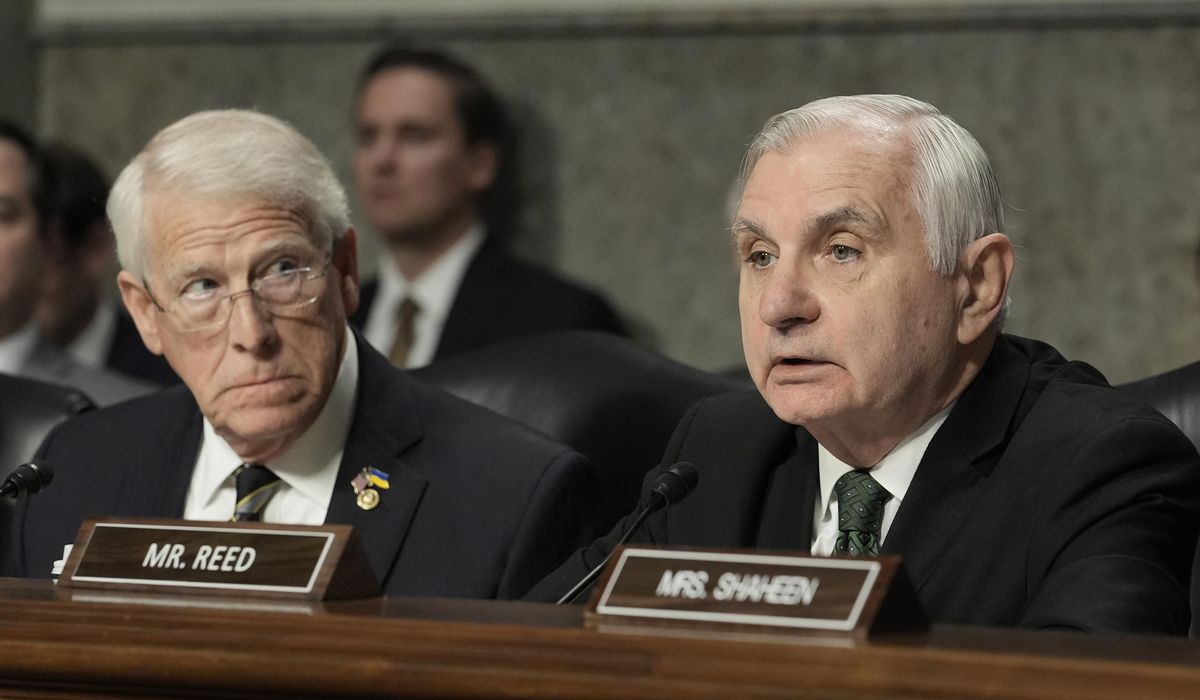


Lawmakers pressed for new solutions Tuesday to the Pentagon’s chronic problem of speeding up the defense acquisition process and deploying new technology in an increasingly adversarial world.
Senate Armed Services Committee Chairman Roger Wicker called during a hearing to explore ways to revamp the defense budgeting process and ease regulatory burdens. The Mississippi Republican complained about the Pentagon persistently falling behind the private sector.
“The United States is entering the most dangerous period we’ve faced since World War II,” Mr. Wicker said. “Our adversaries are rapidly innovating and leveraging commercial technologies. In response, we must expand our capacity to produce and sustain high-end weapons like ships, aircraft and missiles. At the same time we must adopt autonomous, adaptive and networked or swarming systems.”
Mr. Wicker said policymakers must not view defense production decisions as a choice between tradition and innovation. The country, he argued, needs both.
Democrats acknowledged a need for doing things differently, but voiced trepidation about how the Trump administration will proceed.
Rhode Island Sen. Jack Reed, the panel’s ranking Democrat, expressed alarm about Mr. Trump’s approach to the Department of Defense’s civilian workforce.
“I am concerned that we have already begun to see attacks on the department’s civilian workforce,” Mr. Reed said. “The Trump administration has taken pride in its threat to slash the bureaucratic workforce, arguing a false equivalence between fewer personnel and greater efficiency.”
The Pentagon has already started doing things differently. Defense Secretary Pete Hegseth has apparently halted all new Army contract awards and solicitations for new programs, according to Bloomberg.
The halt comes while Mr. Trump’s team conducts a review focused on the Pentagon’s priorities and it is unclear how long it may last.
Defense policy experts believe there are billions of dollars in savings of taxpayer spending available if administration officials act swiftly. The Stimson Center estimated in a new report on Tuesday that some $60 billion could be saved by canceling or reducing spending on dysfunctional weapons systems, emphasizing discipline in dishing out cash, and other efforts to reduce bureaucracy.
With Republicans controlling the White House and Congress, Mr. Wicker, however, has designs on boosting defense spending by as much as $200 billion, according to Breaking Defense.
Some in Washington are increasingly worried that America’s appetite for risk has substantively diminished compared to adversaries such as China.
“The Chinese seem willing to fail,” said Sen. Angus King, a Maine independent who caucuses with Democrats. “They do tests and fail, we have to have every test work. And that has dramatically, in my view, slowed down our development of some of these important technologies.”
Palantir, the Denver-based software giant and military contractor, is intent on expediting the national security community’s adoption of cutting-edge technology. Palantir Chief Technology Officer Shyam Sankar told lawmakers that a large stockpile of weaponry is not an effective deterrent, but a constant flow of mass production can be.
Mr. Sankar argued in his written testimony that perverse incentives were embedded in the U.S. defense acquisition process.
“The Pentagon is a difficult customer. It is also the only customer,” Mr. Sankar said. “The defense market is functionally a monopsony, where the sole buyer shapes the market with overly prescriptive requirements, overly complex regulations, and five-year plans more reminiscent of the countries we defeated in the last century than America’s free, innovative capitalist system.”
Mr. Wicker proposed new legislation in December that he hopes will hasten defense acquisition, accelerate testing procedures, reduce redundancies among federal departments, and restructure the budget through consolidation.
The Mississippi Republican said failing to make changes now will mean disaster in competition against China tomorrow.
“We must change the way the Pentagon does business otherwise there is no way we can maintain deterrence, particularly against China,” he said.
• Ryan Lovelace can be reached at rlovelace@washingtontimes.com.
